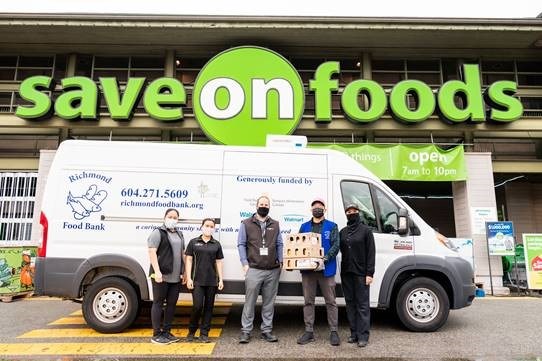Have you ever wondered what happens to all that food you spot in the supermarket that’s just about to reach its “best before” date?
Well, it appears a lot of it, thankfully, doesn’t go to waste and ends up in the hands of the Richmond Food Bank and other local charities.
Supermarkets and wholesalers across the region are often left at the end of each day with what’s referred to as “recoverable food” that’s perfectly fine to eat.
The Richmond Food Bank (RFB) gets about 40 per cent of its fresh donations via a program called Food Mesh, which distributes such produce to charities on behalf of suppliers.
RFB’s executive director, Hajira Hussain, told the Richmond News that deliveries from Vancouver-based Food Mesh account, on average, for 30-40 per cent each month of its fresh donations.
“Other than Food Mesh, we recover from other partners, such as Canadian Dry Storage, Blundell Seafoods, Sunrich foods, Windset farms, Costco etc.,” added Hussain.
“Last year, we recovered a total of 726,113 (kilos) of food, out of which 539,045 (kilos) was perishable food.”
It appears that most of the big supermarket chains in Richmond, such as Save-On and Superstore, contribute to RFB via Food Mesh.
Sobeys Canada – which owns the likes of Safeway and FreshCo – doesn’t hand over its “recoverable food” to Food Mesh, but is just about to start its own program via “Second Harvest,” a similar operation to Food Mesh.
“Our grocery banners across the country are adopting the Food Rescue App as a way for stores to track and donate surplus food,” said a Sobeys Canada spokesperson.
“We are implementing our food rescue program in a phased grocery banner-by-banner approach.
“Beginning November 10, all Safeway locations will adopt the Food Rescue App to donate surplus food to local charities, and then FreschCo will adopt it in spring 2022.”
Hussain said that, in order for the food bank to “recover (food) from a retail chain, the change has to happen at the corporate level.
“Store managers or the individual department managers may have the best intentions to put the food to good use.
“However, many factors such as logistics, time constraints, training costs etc. go into the overall food donation decision making process. Good work takes effort.”
Last week was “Waste Reduction Week” in Canada and Food Mesh announced that Metro Vancouver has provided financial support that will “enable a significant expansion of its regional food recovery network.”
According to Food Mesh, 58 per cent of all food produced in Canada is never eaten.
Second Harvest also revealed last week that there are four times more food charities than grocery stores in Canada.



